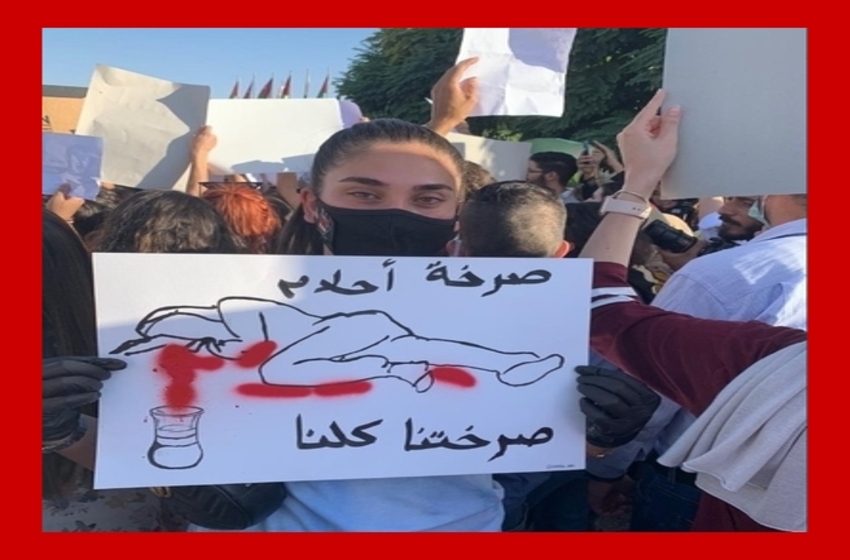Outrage Grows During a Summer of Honor Killings

by Abigail R. Esman Special to IPT News August 11, 2020
Her screams tore through the streets, a young woman running from her family home on a hot summer evening. Behind her, her father gave chase, a cement brick gripped in one hand. Neighbors watched as he overtook her, stood in shock as his arm rose, then fell, crashing the brick against her skull until, covered in her own blood, she collapsed. She died on the sidewalk at his feet.
In a video one neighbor filmed of the incident, the girl’s mother soon appears, carrying a cup of tea for her husband, the man who had just killed her daughter. He takes a sip. He smokes a cigarette. He sits beside the body. There is neither remorse nor sorrow.
The July 17 murder of the woman known only as Ahlam on the streets of a suburb of Amman, Jordan has been classified an “honor killing,” the murder of a family member – almost always a woman – who is perceived to have besmirched the family honor. Only through her death can their honor be redeemed.
It was also just one of a rash of such killings these of young women past three months by their fathers, boyfriends, brothers, cousins, or husbands that has bloodied the Middle East and South Asia. The U.N. estimates that 5,000 such killings take place every year, though activists have long maintained the real number is significantly higher.
Notes Phyllis Chesler, an authority on honor crimes and the author of A Family Conspiracy: Honor Killing: “In my studies, I found that 91% of the honor killings committed on five continents, including in the West, were committed by Muslims. Although Hindus and Sikhs do commit this crime, in their hands it is largely confined to India, it does not travel with them. While my studies have shown that honor killings are not the same as western domestic violence, controversy remains as to whether this crime is caused or allowed by Islamic Sharia law or is a pre-Islamic tribal custom.” But the distinction, she maintains, is unimportant. “Muslim political, legal, and religious leaders have not issued fatwas criminalizing it nor have Muslim governments prosecuted it. The fact that the status of Muslim women, especially in an increasingly Islamist and jihadic era remains subordinate, often sub-human, does not help matters either.”
Hence it is not surprising that in most Islamic countries, those who commit such murders receive light sentences for their crimes, if any.
But that may now be changing, as growing social media and street protests force governments to rethink their lax punishments for the perpetrators of honor crimes, and as women collectively say “enough.”
In May, for instance, Northern Iranian man Reza Ashrafi crept into the room of his 14-year-old daughter carrying a sickle, and beheaded her as she slept. Her crime: falling in love and running away with a man her parents had not given her permission to marry. (Marriage age for women in Iran is 13.) Reza had urged her to come home, promising that all would be forgiven. After the killing, the girl’s aunt told Radio Free Europe, Ashrafi claimed he had proven his honor. Relatives held a ceremony after the child’s death, Deutsche Welle reported, in the name of her “honorable” father.
This was just one of many recent honor killings in Iran. Days earlier, a man in Abadan used a knife to behead his 19-year-old wife, suspecting her of having a lover. With his cousin, who had also assisted him in the crime, he dumped the woman’s body by the river. A week later, another young man in Abadan stabbed his sister to death. He had been angered by gossip that she was having an extramarital affair. And in the Kurdish region of Kermanshah, the father and brothers of Somaye Fathi forced the pregnant 18-year-old to drink aluminum phosphate, killing her and her unborn child.
But it is the murder of 27-year-old Pinar Gultekin in Mugla, Turkey, a southwestern province near the Syrian border, that has gained the most attention worldwide, and inspired the most vocal movements for change. On July 16 – the day before Ahlam’s gruesome murder – Pinar’s ex-boyfriend, furious at her for rebuffing his efforts to rekindle their relationship, beat and strangled her to death. Then he placed her body in a barrel, set it aflame, and when the fires had burned out, embedded it in concrete.
Videos posted online show Pinar, an economics student and the only literate member of her family, as a joyous young woman who loved to sing and enjoyed the company of friends. Her death set off national protests in a country where recorded femicides have skyrocketed from 143 in 2012 to 416 in 2019. Indeed, according to the Guardian, Turkey holds the highest femicide rate in the top 34 OECD countries. Throughout the country, women marched and demonstrated after the killing, calling for an end to the violence.
Those protests were seen as particularly urgent as the country’s ruling AKP Party debates revisions to the Council of Europe’s 2012 “Istanbul Convention” that protects the rights of women – a treaty Turkey was the first to sign.
“It is the obligation of the state to fully address it in all its forms and to take measures to prevent violence against women, protect its victims and prosecute the perpetrators,” the Convention website says.
But times have changed in an increasingly religious and conservative Turkey; indeed, some AKP members are considering withdrawing from the Convention altogether. Last month, AKP party leader Numan Kurtulumus reportedly told a TV interviewer that in his view, “signing the Istanbul Convention was wrong.”
“There are two critical issues in the text of this convention that we… can never accept,” he said. “One of them is gender rights; the other is sexual orientation rights.” A parliamentary vote on Turkey’s continued participation in the Convention is scheduled for later this week.
The social media response to Pinar Gultekin’s killing has been especially powerful, inspiring a wider, global movement. Women across Turkey began posting black-and-white selfies on Instagram with the hashtag #ChallengeAccepted, recasting a 2016 campaign originally created to raise cancer awareness to bring attention to honor killings. The black-and-white images also reflect the too-frequent newspaper images of the women who are killed – images that one account, StopFemicides, has taken to posting in place of selfies – a reminder that these women can no longer take them. The campaign, begun in late July, took fire, expanding internationally to include support for women facing misogyny in all its forms, with Khloe Kardashian, Eva Longoria, and Paris Hilton, among others, joining the cause.
Jordanian women, too, have weaponized social media in their fight, using the hashtags “#Stopkillingwomen” and “#Screams_of_Ahlam.” Film composer Ghiya Rushidat, for instance, posted to Twitter, “I will choose to tweet in English because apparently when this becomes international news, the Jordanian officials and government start paying attention and fear for their reputations and how to salvage that… Women who’ve had their eyes taken out of their face, women who’ve been hit on the head by bricks, all sorts of unimaginable cruel murder. And nothing happens to change this. No matter how many times you report the abuser, they still manage to get away.”
Others have taken to the streets. In Amman, hundreds stood outside the parliament on July 22, defying COVID-19 restrictions on large crowds and carrying signs that read “when blood becomes tea,” a clear reference to Ahlam’s murder.
Women’s rights activists see these efforts as sign of change. By current Jordanian law, murderers’ sentences can be halved if the victim’s family forgives the killer – who is usually acting on the family’s behalf in the first place. More, the “Fit of Fury” defense allows the killers to blame the victim for stirring up their rage, thereby reducing their penalty to serving as little as one year in prison.
But this summer’s outcry has put pressure on the government to rethink that approach. Even Jordan’s Princess Basma bint Talal, who founded Jordan’s National Committee for Women, issued a statement on Facebook, writing, “how many other women must die before adequate punitive steps are taken; or so that loopholes in the law can no longer be used to the advantage of the perpetrators, in order to give them reduced sentences for murder. A radical shift in approach at all levels needs to signal the fact that conditions for violence, domestic or otherwise will no longer be tolerated or even condoned. There is no honour in honour killing and we can no longer look away.” She added the hashtags “#NoHonourInKilling” and “#DontLookAway.”
It may be in Iran, however, where those changes are closest to becoming possible. According to the Christian Science Monitor, while most murders such as Romina Ashrafi’s tend to be swept under the proverbial rug, “the barbarous details of Romina’s death spread quickly, moving the needle of outrage and change toward protecting the lives of women and children.” Mobilized by the horror of the crime and the volume of the outcry in its wake, President Hassan Rouhani quickly enacted what is now called “Romina’s Law,” a bill that had languished for over a decade, to criminalize child abuse and neglect. Another law, not yet passed, would criminalize sexual and physical abuse of women.
Here, too, much of the activism has taken place on social media, reflecting what the New York Times described as a #MeToo moment of women “pouring out their own stories of abuse at the hands of male relatives in hopes of shedding light on a problem that is usually kept quiet.” Many Iranian women also joined in the Turkish #ChallengeAccepted Instagram campaign.
While some maintain Rouhani is only posturing, and there is little likelihood such laws would be enforced in a country where, the New York Times says, nearly 30 percent of all murders are honor killings of young women, the fervent activism, coupled with its global reach on social media, is nonetheless rushing in a sense of hope. It is a hope that is sweeping the region as women, empowered by one another, say “no more.” Or as Fatin Otoom, the founder of a Jordanian feminist group recently renamed “Ahlam’s Screams,” put it, “We can’t just stand and watch girls get killed. This is stupidity, enough is enough.”
Abigail R. Esman is a freelance writer based in New York and the Netherlands. She is the author of Radical State: How Jihad Is Winning Over Democracy in the West (Praeger, 2010). Her next book, Rage: Narcissism, Patriarchy, and the Culture of Terrorism, will be published by Potomac Books in October, 2020. Follow her at @radicalstates.
Copyright © 2020. Investigative Project on Terrorism. All rights reserved.















